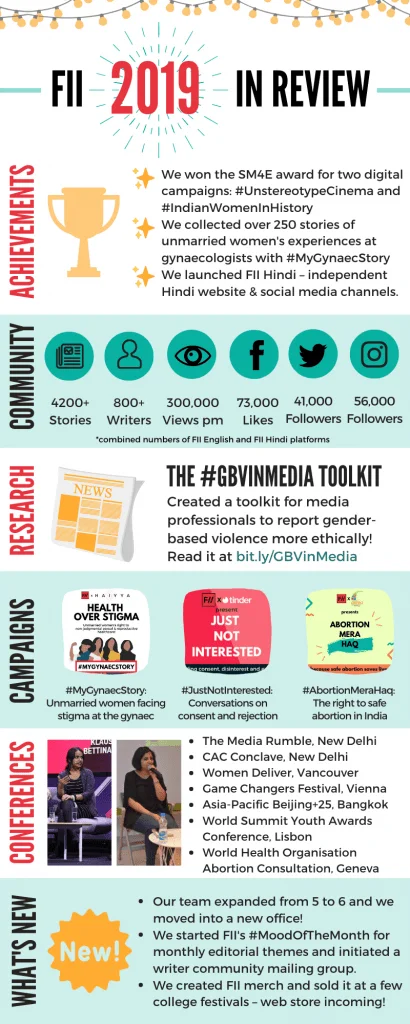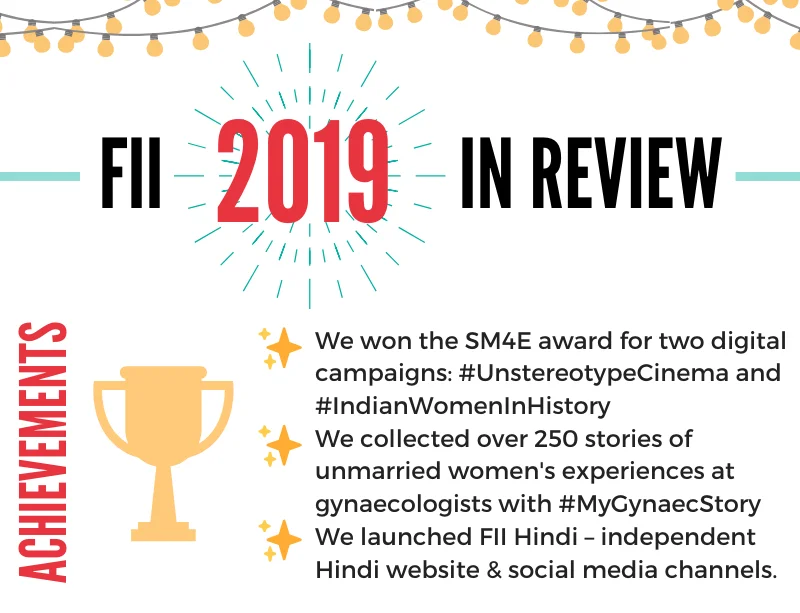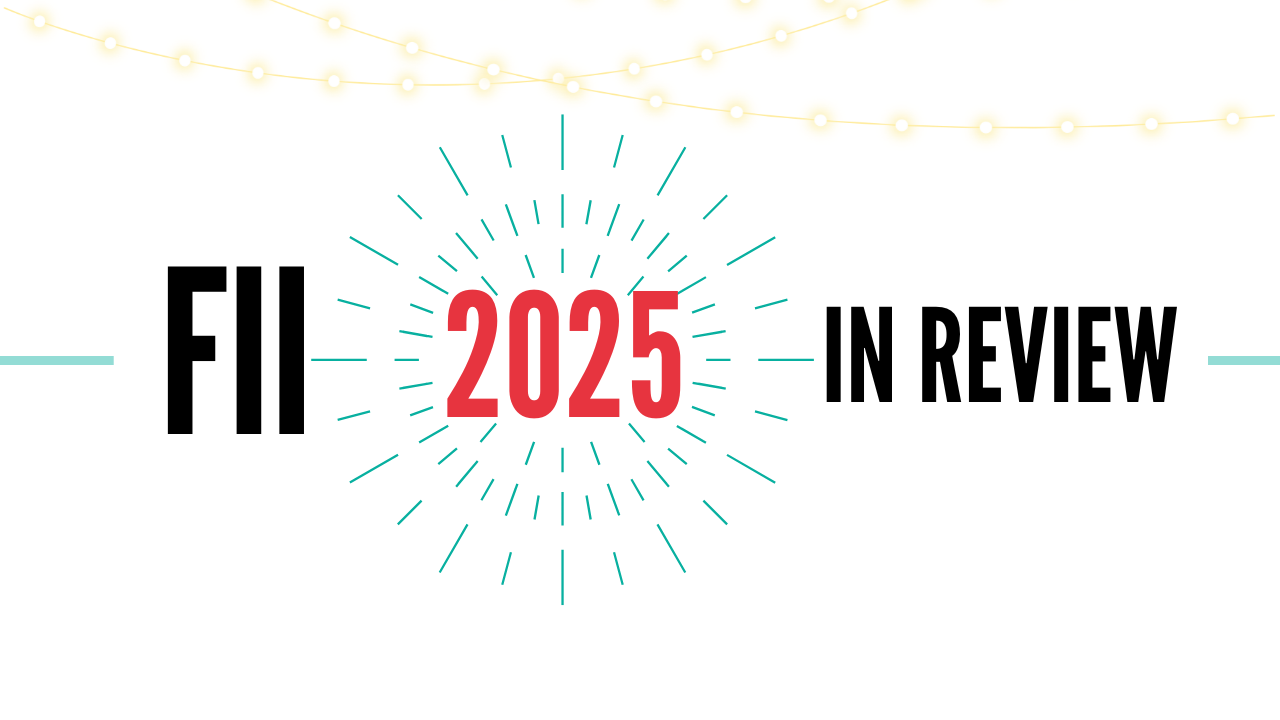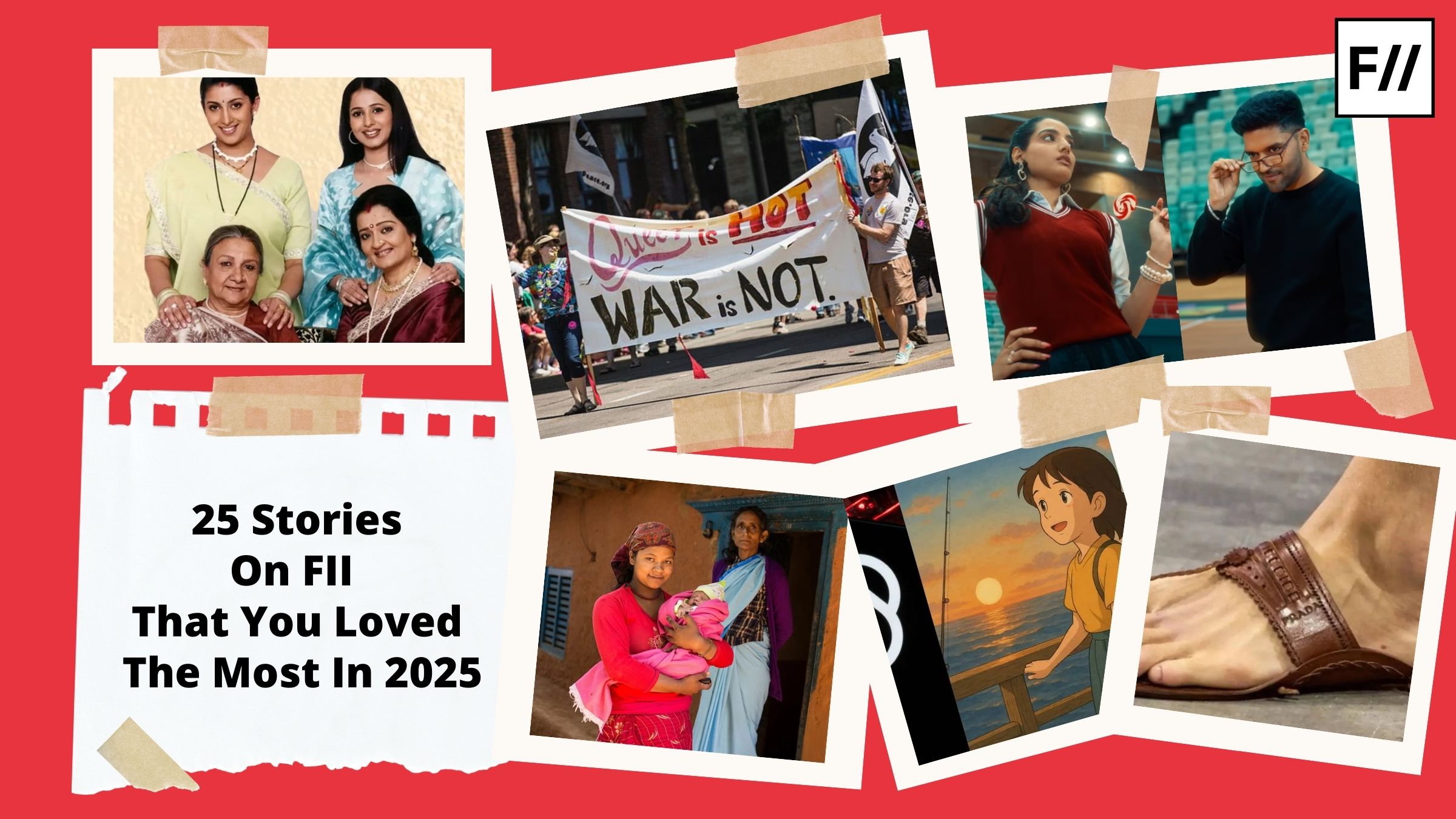As 2019 draws to a tumultuous end, we are looking back on the year that was. This year, our team grew by one member, and we are now a team of six, comprising of Japleen Pasricha (Founder-Director), Asmita Ghosh (Campaign Manager), Swati Singh (Hindi Editor), Pragya Roy (Content Editor), Maduli Thaosen (Content Strategist) and Manasi Pant (Digital Editor). Apart from the core team of course, we are joined by the wonderful FII community of writers, readers and social media followers that make us what we are. Late this year, we also shifted offices to a larger space in Naraina Vihar, New Delhi.
Over the course of this year, we ran several successful digital advocacy campaigns, and saw a more concerted shift in creating social media content that engaged with the news as well as important moments in the history of various social justice movements. In April, which is celebrated as Dalit History Month, we ran a campaign with All India Dalit Mahila Adhikar Manch (AIDMAM) and focussed on putting out Dalit history pieces. We culminated the month with a fantastic panel discussion featuring five Dalit women leaders, scholars and activists who spoke about Dalit history and their work in social justice for the Dalit community.
Later in the year, we marked Asexuality Awareness Week with a series of posters featuring myths and facts about asexuality as well as Transgender Awareness Week. More recently, we have been committed to covering the resistance to the Trans Bill 2019 as well as the Citizenship Amendment Act 2019, and have devoted several articles, Twitter threads, social media posts, infographics and videos to educate, organise and amplify these issues.
Apart from these efforts at documenting, educating and amplifying Indian feminist news and history, we also worked with several partners to create campaigns on a variety of feminist issues, many of them around sexual and reproductive health. In May, we ran the #AbortionMeraHaq campaign (abortion is my right) with Asia Safe Abortion Partnership, where we spoke extensively about the legal basis, medical facts and social issues surrounding safe abortion in India. From June to October, we worked with Haiyya on the heavily successful #MyGynaecStory campaign, where we amplified experiences of unmarried women’s experiences of stigma and discrimination at the gynaecologist. During this campaign, the offline and online mobilisation led to the Delhi Medical Council formally declaring that they would begin to sensitise their medical community towards the treatment of unmarried women in India. We also ran a Twitter storm that saw over 80 women tweet about their experiences, with nearly one billion (960,000+) Twitter impressions during the storm. We also worked with PUMA, the High Commission of Canada, Tinder and several non-profits over the course of the year.
In a bid to tighten our wonderful writer’s community as well as serve up fresh inspiration to our writers, we brought about some changes in our editorial strategy. We now have a mailing list of interested writers and past interns where we can mutually pitch article ideas and find other ways to collaborate amongst ourselves, and we have also started the FII #MoodOfTheMonth, where we encourage our writer community to write on a new theme each month. Previous monthly themes have included travel, regional cinema and fashion. (If you are an existing FII writer and would like to join the writers’ mailing list, please email japleen@feminisminindia.com!
We also made a major shift to our platform by launching a separate website and social media channels for FII Hindi. We plan to expand this platform in the upcoming year with videos, posters and articles disseminating feminist concepts and commentary in Hindi. Follow @FIIHindi everywhere!
In July 2019, we launched the #GBVinMedia toolkit – a toolkit for ethical journalism practices when reporting on gender-based violence. The #GBVinMedia toolkit has been presented in four cities across India, with launch events in Delhi, Mumbai and Kolkata, and university seminars in Mumbai and Chennai. It was also presented at The Media Rumble 2019 – a national level media conference in Delhi by the digital media platform Newslaundry, and at a university panel discussion on Women in Media at Lady Shri Ram College for Women. The toolkit has been covered by multiple news organisations, including The Hindu, ETV Bharat, and Newslaundry. We are currently in the midst of a digital advocacy campaign, disseminating the toolkit’s information in the form of easily consumable social media and website content!
Speaking of conferences, the FII team had several opportunities to attend workshops, trainings, conferences and panel discussions this year. Cumulatively, we attended several training programs including the SI Leader Lab in Stockholm, the CREA Feminist Leadership Program in Nepal, the ASAP Youth Advocacy Refresher Institute in Mumbai, the Safe Access Fellowship in New Delhi, the Youth Ki Awaaz Climate Action Network in New Delhi, and the Rise Up Youth Champions Institute in San Francisco. The team also represented FII’s work at several global and national conferences, including the Comprehensive Abortion Care Conclave by IPAS in New Delhi, the Women Deliver conference in Vancouver, the Beijing+25 conference by APWLD in Bangkok, the 4Gamechangers Festival in Vienna, and being a part of a global consultation on abortion for the World Health Organisation in Geneva.
What would you like FII to do more of next year? Fill our feedback form here so we can make your expectations from us a reality! As always, you have our utmost gratitude for engaging with FII – whether you have followed us over the years or are one of our new community members. Here is a snippet of what we’ve achieved this year, in an infographic:

Until next year,
Team FII
Also read: FII’s Year In Review 2018, 2017, 2016, 2015 and 2014
About the author(s)
Feminism In India is an award-winning digital intersectional feminist media organisation to learn, educate and develop a feminist sensibility and unravel the F-word among the youth in India.




